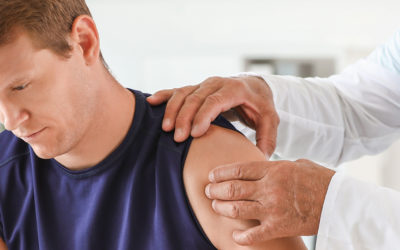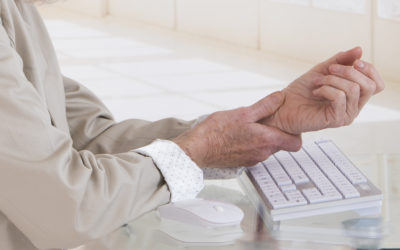Rotator Cuff Repair
The shoulder has the greatest range of motion of any joint in the body, but that very flexibility makes it prone to injury and wear. Many problems are caused by repeated overhead motions for a long period of time. Athletes and do-it-yourselfers are especially vulnerable to overuse problems—including torn rotator cuffs. This can cause serious shoulder pain and weakness, and make it difficult to perform even simple tasks like lifting groceries or getting dressed.
If a severely injured shoulder is keeping you from living like you used to, you may be a candidate for rotator cuff surgery. At Evanston Regional Hospital, orthopedic surgeons specialize in arthroscopic rotator cuff repair, a minimally invasive option that can help get your shoulder, and life, back in motion.
About Rotator Cuff Injuries
An injury to the rotator cuff—the group of muscles and tendons that keep your shoulder in place—can happen suddenly on the playing field or at work, develop gradually or simply occur as a result of aging.
Common symptoms of a rotator cuff tear include:
- Recurrent pain, especially with certain activities
- Pain that prevents you from sleeping on your injured side
- Grating or cracking sounds when moving your arm
- Limited ability to move your arm
- Muscle weakness
If your symptoms and tear are mild, surgeons will usually first recommend nonsurgical options, including rest, physical therapy or anti-inflammatory injections. But, if the pain worsens and continues to limit your active life, we may suggest surgery to help restore mobility and provide the lasting relief you need.
Arthroscopic Repair: Better Precision, Less Incision
In the past, surgery to repair the rotator cuff has been done through a large shoulder incision, and the muscle over the rotator cuff was separated. But newer, arthroscopic techniques, like those we use at Evanston Regional Hospital, can be done with just a few small incisions, with minimal disruption to surrounding tissue.
The procedure involves inserting specialized, miniature instruments, including a small camera called an arthroscope. The camera displays the image of the joint on a large monitor, allowing your surgeon to pinpoint and repair the damaged area.
Arthroscopic rotator cuff repair may offer you a variety of benefits compared to open surgery, including:
- Less post-operative pain
- Less scarring
- Fewer complications
- Faster healing time
- Easier rehabilitation
- More shoulder flexibility and function
- Quicker return to the life you love
At Evanston Regional Hospital, we usually perform arthroscopy on an outpatient basis, allowing you to leave the hospital the same day and recover comfortably at home.
Rehabilitation to Speed Healing
Following surgery, dedicated physical and occupational therapists will work closely with you to create a custom rehabilitation plan. The goal is to you help regain as much mobility and strength in your shoulder as possible. Your rehabilitation team will also communicate regularly with your surgeon to ensure you’re progressing well.
Schedule a Consultation
Call 307-789-9355
Related Services and Conditions
Orthopedics
Don’t let joint pain hold you back from living your life! Evanston Regional Hospital offers inpatient and outpatient orthopedic services including prevention, diagnosis, treatment and rehabilitation for injuries and disorders of the skeletal system and associated...
Arthroscopic Surgery
Joint pain can really hurt, especially when it keeps you from what you need or love to do. At Evanston Regional Hospital, we can help you get back on track. That includes minimally invasive arthroscopic surgery to treat a variety of knee, shoulder and wrist...
Joint Replacement
Considering joint replacement surgery? We know it may seem overwhelming. That's why at , orthopedic specialists make the joint replacement journey a little easier. Your skilled orthopedic team will see you through every phase of care, from...
Anterior Hip Replacement
In addition to performing traditional orthopedic procedures, the orthopedic surgeons at use minimally invasive techniques, which often allow for better precision, with less incision. That includes the direct anterior approach to hip...
Knee Replacement
Your knee is the largest joint in your body, which makes it vulnerable to injury and other problems. Sports, exercise, and general wear and tear can cause muscle strains, tendinitis, and more serious injuries. When medications and other treatments can’t keep your knee...
Shoulder Joint Replacement
Many people know someone with an artificial knee or hip joint. Shoulder replacement is less common, but this surgery has come to be used for many other painful conditions of the shoulder. These include: Osteoarthritis (degenerative joint disease) Rheumatoid arthritis...
Total Hip Replacement
Whether you have just begun exploring treatment options or have already decided with your orthopedic Surgeon to undergo hip replacement surgery, this information will help you understand the benefits and limitations of this orthopedic treatment. You will learn… How a...
Knee Ligament Repair
Your knee is the largest joint in your body, which also makes it vulnerable to injury or other problems. Sports, exercise and general wear and tear can cause muscle strains, tendinitis and more serious injuries—including ligament tears. With proper treatment, this can...
Nerve Decompression Surgery
Nerve disorders like carpal or cubital tunnel syndrome may start with mild discomfort, but over time, can interfere with both your life and work. And, while treatments like medication may help, sometimes surgery is your best solution for long-term relief. At [sc...









